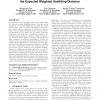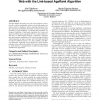504 search results - page 67 / 101 » Determining the user intent of web search engine queries |
WWW
2010
ACM
14 years 3 months ago
2010
ACM
We introduce a new dissimilarity function for ranked lists, the expected weighted Hoeffding distance, that has several advantages over current dissimilarity measures for ranked s...
DEXAW
2000
IEEE
14 years 1 months ago
2000
IEEE
With the massive advance of electronic document repositories, usable interfaces to these repositories gain importance. While sophisticated information retrieval techniques provide...
CIKM
2010
Springer
13 years 6 months ago
2010
Springer
Though children frequently use web search engines to learn, interact, and be entertained, modern web search engines are poorly suited to children's needs, requiring relativel...
HT
2009
ACM
14 years 3 months ago
2009
ACM
Sixearch.org is a peer application for social, distributed, adaptive Web search, which integrates the Sixearch.org protocol, a topical crawler, a document indexing system, a retri...
ACMDIS
2008
ACM
13 years 11 months ago
2008
ACM
Throughout many of the different types of Web searches people perform, the primary tasks are to first craft a query that effectively captures their information needs, and then eva...


